牛津译林版(2019)必修 第三册 U4 Scientists who changed the world Grammar & Usage(51张PPT)
文档属性
| 名称 | 牛津译林版(2019)必修 第三册 U4 Scientists who changed the world Grammar & Usage(51张PPT) |
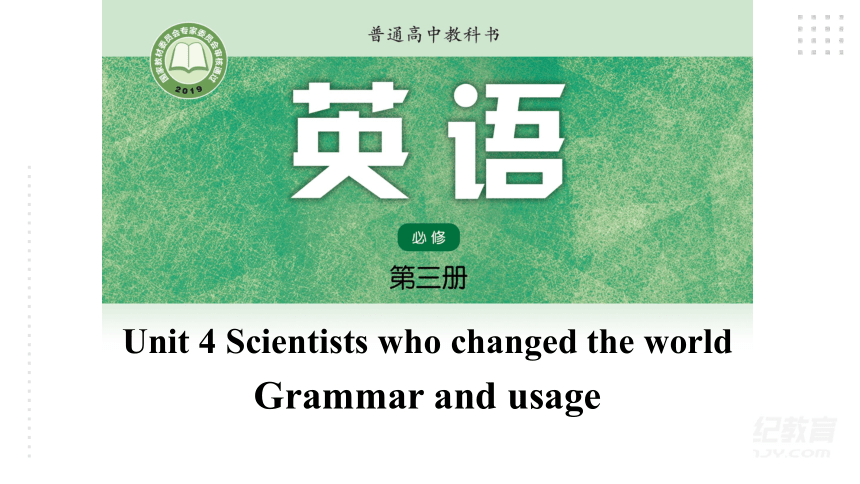
|
|
| 格式 | zip | ||
| 文件大小 | 2.5MB | ||
| 资源类型 | 试卷 | ||
| 版本资源 | 牛津译林版(2019) | ||
| 科目 | 英语 | ||
| 更新时间 | 2021-07-12 00:00:00 | ||
图片预览

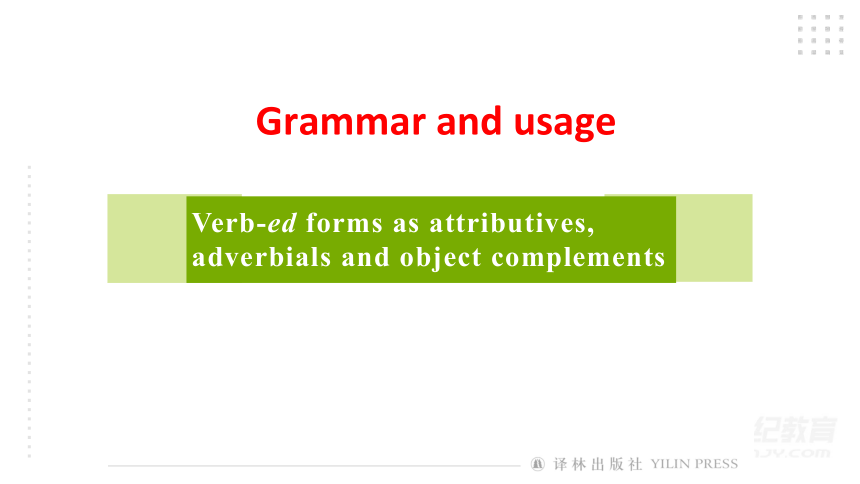
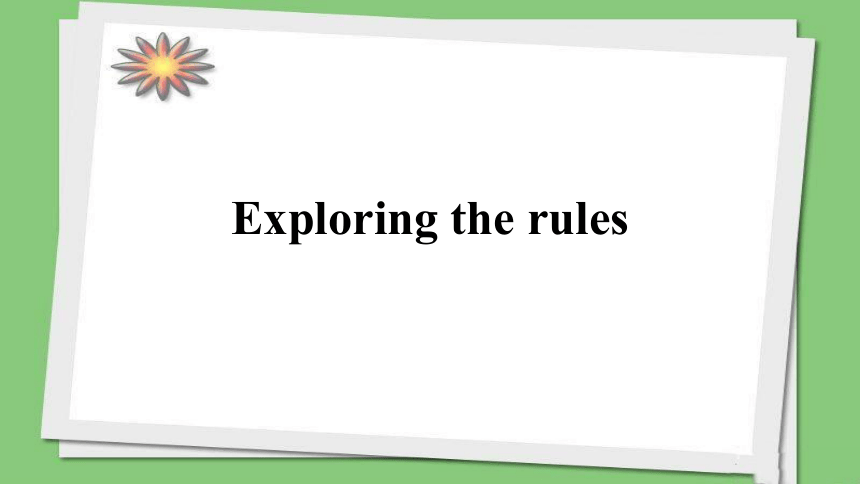
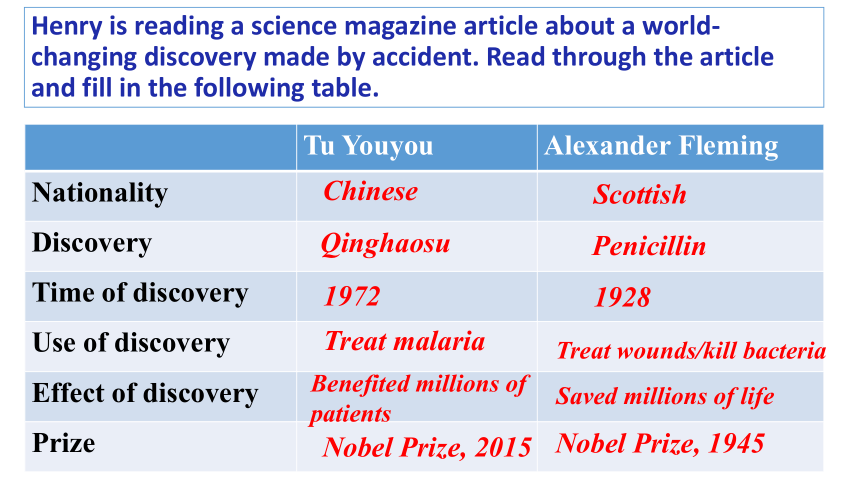
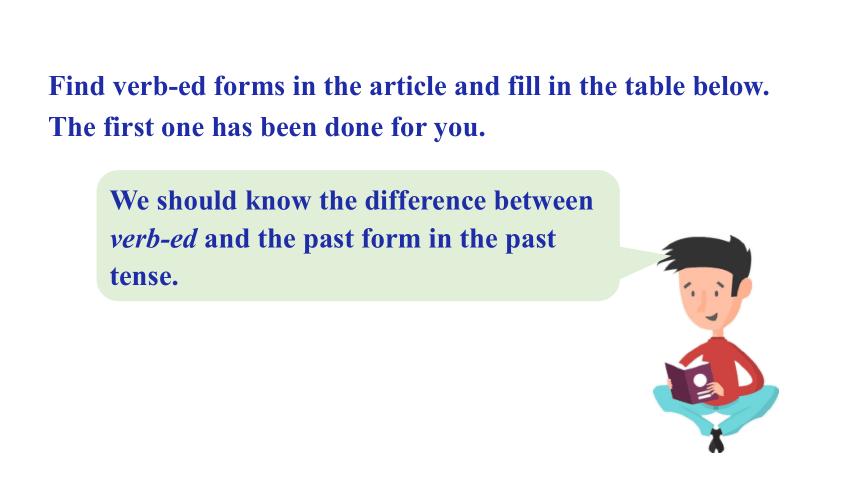
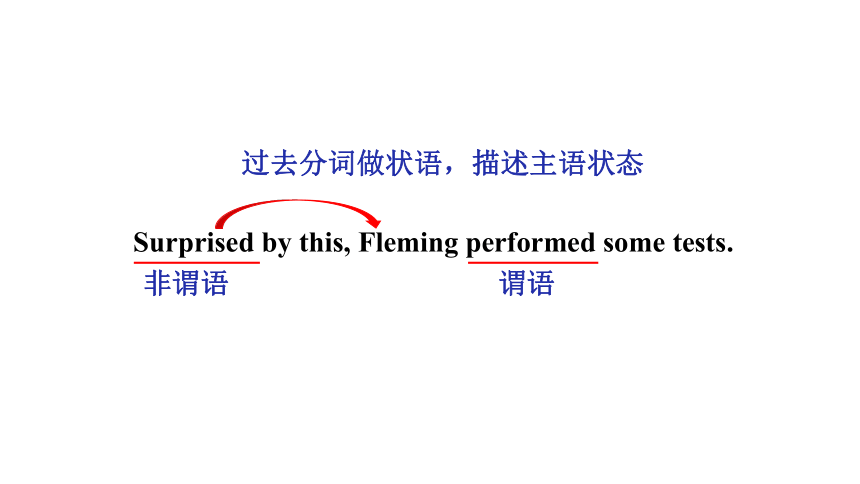
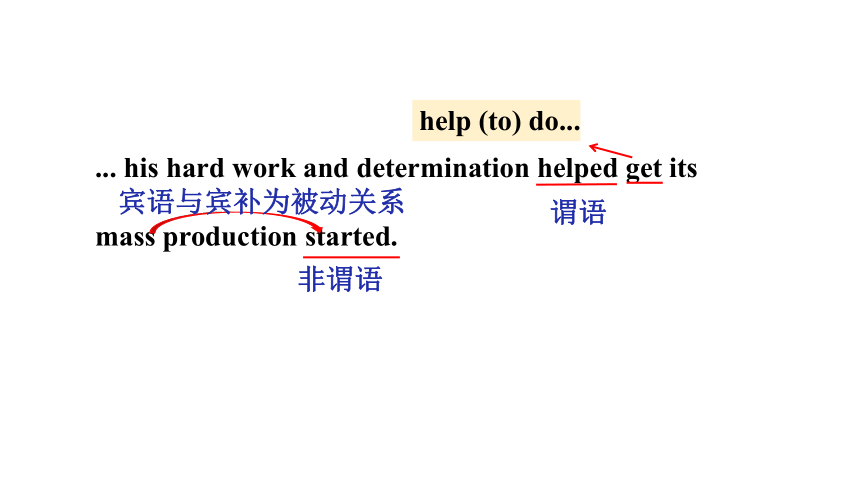
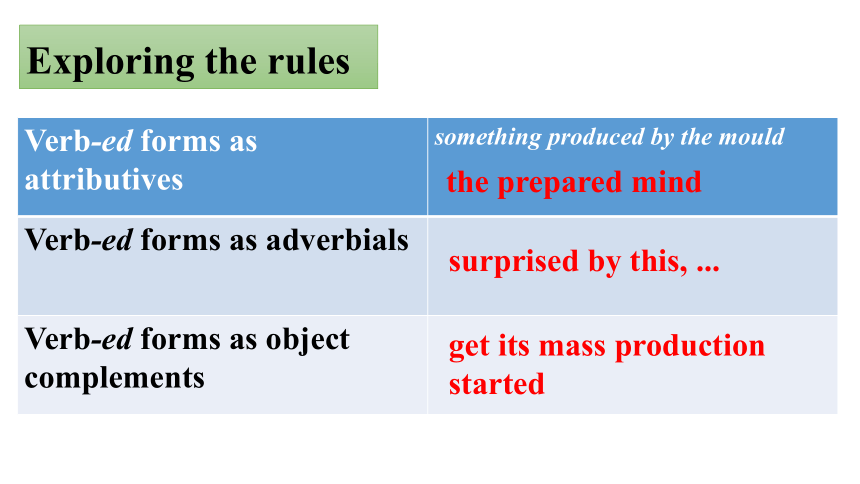
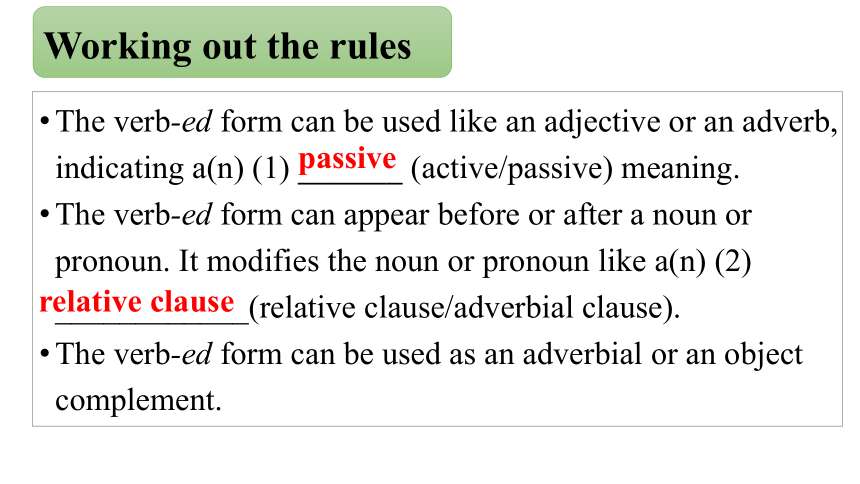
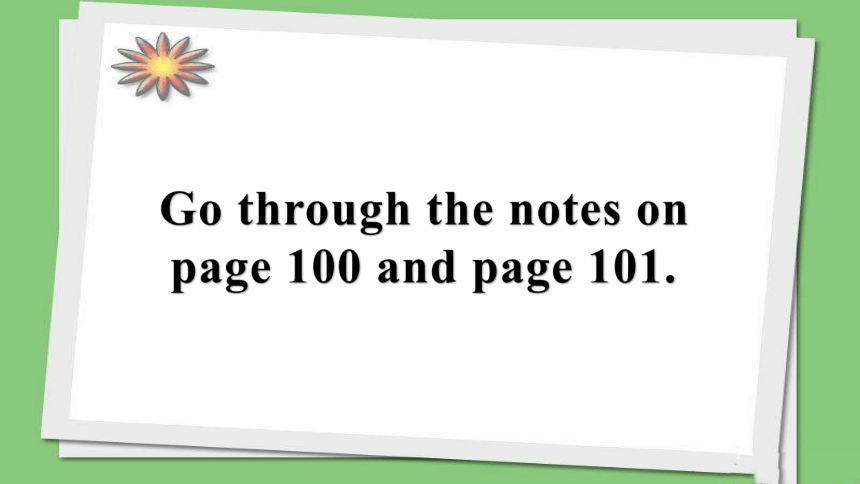
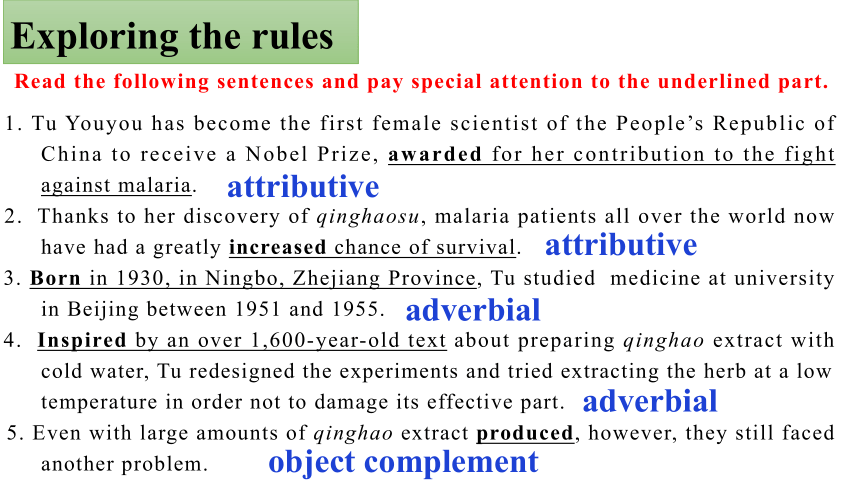
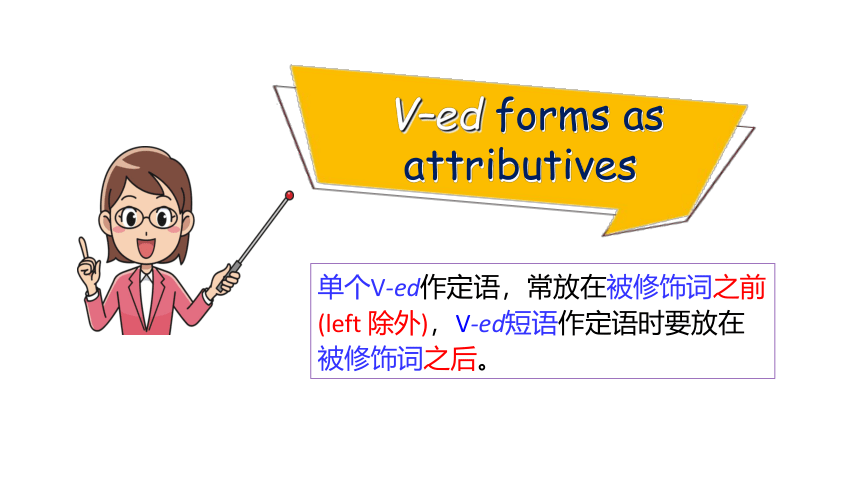
文档简介
(共51张PPT)
Unit
4
Scientists
who
changed
the
world
Grammar
and
usage
Verb-ed
forms
as
attributives,
adverbials
and
object
complements
Grammar
and
usage
Exploring
the
rules
Tu
Youyou
Alexander
Fleming
Nationality
Discovery
Time
of
discovery
Use
of
discovery
Effect
of
discovery
Prize
Chinese
Scottish
1972
Penicillin
1928
Treat
malaria
Treat
wounds/kill
bacteria
Benefited
millions
of
patients
Saved
millions
of
life
Nobel
Prize,
2015
Henry
is
reading
a
science
magazine
article
about
a
world-changing
discovery
made
by
accident.
Read
through
the
article
and
fill
in
the
following
table.
Qinghaosu
Nobel
Prize,
1945
Find
verb-ed
forms
in
the
article
and
fill
in
the
table
below.
The
first
one
has
been
done
for
you.
We
should
know
the
difference
between
verb-ed
and
the
past
form
in
the
past
tense.
Surprised
by
this,
Fleming
performed
some
tests.
谓语
非谓语
过去分词做状语,描述主语状态
...
his
hard
work
and
determination
helped
get
its
mass
production
started.
谓语
非谓语
help
(to)
do...
宾语与宾补为被动关系
Verb-ed
forms
as
attributives
something
produced
by
the
mould
Verb-ed
forms
as
adverbials
Verb-ed
forms
as
object
complements
the
prepared
mind
surprised
by
this,
...
get
its
mass
production
started
Exploring
the
rules
The
verb-ed
form
can
be
used
like
an
adjective
or
an
adverb,
indicating
a(n)
(1)
(active/passive)
meaning.
The
verb-ed
form
can
appear
before
or
after
a
noun
or
pronoun.
It
modifies
the
noun
or
pronoun
like
a(n)
(2)
____________(relative
clause/adverbial
clause).
The
verb-ed
form
can
be
used
as
an
adverbial
or
an
object
complement.
passive
relative
clause
Working
out
the
rules
Go
through
the
notes
on
page
100
and
page
101.
Exploring
the
rules
1.
Tu
Youyou
has
become
the
first
female
scientist
of
the
People’s
Republic
of
China
to
receive
a
Nobel
Prize,
awarded
for
her
contribution
to
the
fight
against
malaria.
2.
Thanks
to
her
discovery
of
qinghaosu,
malaria
patients
all
over
the
world
now
have
had
a
greatly
increased
chance
of
survival.
3.
Born
in
1930,
in
Ningbo,
Zhejiang
Province,
Tu
studied
medicine
at
university
in
Beijing
between
1951
and
1955.
4.
Inspired
by
an
over
1,600-year-old
text
about
preparing
qinghao
extract
with
cold
water,
Tu
redesigned
the
experiments
and
tried
extracting
the
herb
at
a
low
temperature
in
order
not
to
damage
its
effective
part.
5.
Even
with
large
amounts
of
qinghao
extract
produced,
however,
they
still
faced
another
problem.
Read
the
following
sentences
and
pay
special
attention
to
the
underlined
part.
attributive
attributive
adverbial
adverbial
object
complement
V–ed
forms
as
attributives
单个V-ed作定语,常放在被修饰词之前(left
除外),V-ed短语作定语时要放在被修饰词之后。
1.
单个V-ed作定语通常前置
a.
及物动词的-ed形式作定语,
一般兼有被动和完成的意义。
b.
不及物动词的-ed形式作定语,
有主动和完成意义。
①
a
grown
woman
一位成年妇女
②
an
escaped
prisoner
一名逃犯
①
a
broken
cup
一个破杯子
②
a
wounded
soldier
一名伤员
=
a
cup
that
has
been
broken
=
a
woman
that
has
grown
a.
the
color
TV
set
produced
last
year
=
the
color
TV
set
that
was
produced
last
year
b.
a
letter
written
to
me
by
my
daughter
=
a
letter
that
was
written
to
me
by
my
daughter
一封我女儿写给我的信
去年生产的彩色电视机
2.
V-ed短语作定语通常后置,其作用相当于定语从句。
3.
V-ed有时还可用作非限制性定语,相当于一个非限制性定语从句,前后用逗号分开。
a.
The
houses,
built
last
year,
were
destroyed
by
the
earthquake
yesterday.
=The
houses,
which
were
built
last
year,
were
destroyed
by
the
earthquake
yesterday.
去年建的这些房子,昨天被地震摧毁了。
b.
Some
of
them,
born
and
brought
up
in
rural
villages,
had
never
seen
a
train.
他们当中有一些人,生长在农村,从未见过火车。
=Some
of
them,
who
were
born
and
brought
up
in
rural
villages,
had
never
seen
a
train.
1.
Most
of
the
people
(invite)
to
the
party
are
famous
scientists.
2.
The
EMS
(post)
yesterday
will
reach
my
brother
in
three
days.
3.
There
has
been
nothing
(change)
here
since
I
left
this
city.
4.
She
is
a
(respect)
teacher.
invited
posted
changed
Practice
respected
5.
There
was
an
________
(excite)
look
on
his
face
when
the
actress
appeared.
6.
It’s
wrong
for
the
___________
(develop)
countries
to
control
the
world.
7.
I
have
collected
the
money
______
(need)
in
the
project.
8.
This
is
the
problem
_________
(discuss)
at
the
meeting
yesterday.
9.
The
_________
(surprise)
look
on
his
face
suggested
that
he
had
not
expected
so.
excited
developed
needed
discussed
surprised
V–ed
forms
as
adverbials
①
Destroyed
by
the
hurricane,
the
old
house
is
nowhere
to
be
found.
由于飓风的破坏,那座老房子哪也找不到了。
①
Destroyed
by
the
hurricane,
the
old
house
is
nowhere
to
be
found.
由于飓风的破坏,那座老房子哪也找不到了。
(As/Because
it
has
been)
②
Bitten
by
the
cobra,
the
man
was
in
danger.
因为被眼镜蛇咬了,这人处在危险中。
①
Destroyed
by
the
hurricane,
the
old
house
is
nowhere
to
be
found.
由于飓风的破坏,那座老房子哪也找不到了。
(As/Because
it
has
been)
②
Bitten
by
the
cobra,
the
man
was
in
danger.
因为被眼镜蛇咬了,这人处在危险中。
①
Destroyed
by
the
hurricane,
the
old
house
is
nowhere
to
be
found.
由于飓风的破坏,那座老房子哪也找不到了。
(As/Because
it
has
been)
(Because
he
was)
②
Bitten
by
the
cobra,
the
man
was
in
danger.
因为被眼镜蛇咬了,这人处在危险中。
①
Destroyed
by
the
hurricane,
the
old
house
is
nowhere
to
be
found.
由于飓风的破坏,那座老房子哪也找不到了。
(As/Because
it
has
been)
(Because
he
was)
1.
作原因状语
①
Seen
from
the
top
of
the
building,
our
school
looks
beautiful.
从楼顶上看,学校看起来很美。
①
Seen
from
the
top
of
the
building,
our
school
looks
beautiful.
从楼顶上看,学校看起来很美。
(When
it
is)
②
Water
boils,
heated
to
100℃.
水加热到100度就沸腾。
①
Seen
from
the
top
of
the
building,
our
school
looks
beautiful.
从楼顶上看,学校看起来很美。
(When
it
is)
②
Water
boils,
heated
to
100℃.
水加热到100度就沸腾。
①
Seen
from
the
top
of
the
building,
our
school
looks
beautiful.
从楼顶上看,学校看起来很美。
(When
it
is)
(when
it
is)
2.
作时间状语
虽然他很疲倦,他仍然继续工作。
Tired,
he
went
on
working.
(Although
he
was)
虽然他很疲倦,他仍然继续工作。
Tired,
he
went
on
working.
(Although
he
was)
虽然他很疲倦,他仍然继续工作。
3.
作让步状语
Tired,
he
went
on
working.
Punished
by
the
parents,
he
won't
come
again.
(Although
he
was)
虽然他很疲倦,他仍然继续工作。
他若是被家长惩罚了,就再也不能来了。
3.
作让步状语
Tired,
he
went
on
working.
Punished
by
the
parents,
he
won't
come
again.
(Although
he
was)
(If
he
is)
虽然他很疲倦,他仍然继续工作。
他若是被家长惩罚了,就再也不能来了。
3.
作让步状语
Tired,
he
went
on
working.
Punished
by
the
parents,
he
won't
come
again.
(Although
he
was)
(If
he
is)
虽然他很疲倦,他仍然继续工作。
他若是被家长惩罚了,就再也不能来了。
3.
作让步状语
Tired,
he
went
on
working.
4.
作条件状语
①
She
walked
out
of
the
house,
followed
by
her
little
daughter.
她走出房间,后面跟着她的小女儿。
①
She
walked
out
of
the
house,
followed
by
her
little
daughter.
她走出房间,后面跟着她的小女儿。
(and
she
was)
②
Absorbed
in
the
work,
he
neglected
food
and
sleep.
他专心于工作,废寝忘食。
①
She
walked
out
of
the
house,
followed
by
her
little
daughter.
她走出房间,后面跟着她的小女儿。
(and
she
was)
②
Absorbed
in
the
work,
he
ignored
food
and
sleep.
他专心于工作,废寝忘食。
①
She
walked
out
of
the
house,
followed
by
her
little
daughter.
她走出房间,后面跟着她的小女儿。
(and
she
was)
(He
was)
②
Absorbed
in
the
work,
he
neglected
food
and
sleep.
他专心于工作,废寝忘食。
①
She
walked
out
of
the
house,
followed
by
her
little
daughter.
她走出房间,后面跟着她的小女儿。
(and
she
was)
(He
was)
5.
作伴随或方式状语
特别提醒:
Given
more
time,
he
could
finish
the
task.
Given
more
time,
I
think
he
could
finish
the
task.
动词-ed形式作状语,其逻辑主语与句子主语一致。
(
√
)
(×)
Challenge
yourselves
The
teacher
entered
the
classroom,
and
he
was
followed
by
some
students.
2.
Caught
in
a
heavy
rain,
he
was
all
wet.
1.
Asked
what
had
happened,
he
kept
silent.
3.
Given
more
time,
we
would
be
able
to
do
the
work
much
better.
4.
Left
alone
at
home,
the
little
boy
didn't
feel
afraid
at
all.
5.
The
teacher
entered
the
classroom,
followed
by
some
students.
时间
原因
条件
让步
伴随
?
V-ed在句中可充当时间、原因、条件、让步状语,相当于一个状语从句;
When
he
was
asked
what
had
happened,
he
kept
silent.
Because
he
was
caught
in
a
heavy
rain,
he
was
all
wet.
If
we
were
given
more
time,
we
would
be
able
to
do
the
work
much
better.
Although
he
was
left
alone
at
home,
the
little
boy
didn’t
feel
afraid
at
all.
?
V-ed在句中可充当伴随或方式状语,相当于一个
并列句;
V-ed充当状语时,其逻辑主语必须与句子的主语一致。
V–ed
forms
as
object
complements
?
V-ed作宾语补足语表示被动或完成的意义。
?
V-ed与宾语之间存在逻辑上的动宾关系。
1.
表示感观、感觉和发觉的动词。如:
watch,
observe,
see,
hear,
listen
to,
feel,
notice,
find等。
①
When
we
got
to
school,
we
saw
the
door
_____
(lock).
②
He
found
his
house
______
(break)
into
when
he
got
back
home.
V-ed作宾语补足语常用于以下几种情况:
locked
broken
①
You'd
better
keep
the
guests
_______
(inform)
of
what
happened
outside.
②
We're
having
our
car
______
(repair).
③
I'm?trying?to
get
this
article
_______
(write)
for
Thursday.?
④
She
had
to?shout?to
make
herself
_______
(hear)
above
the?sound?of
the?music.
2.
表示“致使”意义的动词。
如:have,
make,
get,
keep等。
informed
repaired
written
heard
3.
在with的复合结构中也可用V-ed作宾语补足语。这一结构通常在句中作时间、方式、条件、原因等状语。
①
The
murderer
was
brought
in,
with
his
hands
____
(tie)
behind
his
back.
②
With
water
_______
(heat),
we
can
see
the
steam.
?③
With
the
matter
_______
(settle),
we
all
went
home.?
tied
heated
settled
Applying
the
rules
用括号内所给单词的适当形式填空。
1.
Watching
the
__________
(finishing/finished)
painting,
Alice
couldn't
help
smiling.
2.
Most
of
the
artists
__________
(inviting/invited)
to
the
party
were
from
South
Africa.
3.
Do
you
still
remember
the
Olympic
Games________(held/holding)
in
Beijing
in
2008?
4.
The
__________
(surprising/surprised)
look
on
her
face
suggested
that
she
hadn't
known
the
news
before.
5.
There
are
many
________
(fallen
/
falling)
leaves
on
the
street.
finished
invited
held
surprised
fallen
6.
They
represent
the
earth
_______
(come)
back
to
life
and
best
wishes
for
new
beginnings.(2020高考题)
7.
Some
people
never
desire
the
happiness
__________to
others;
they
always
believe
they
have
their
own.(belong)
8.
The
professor
sat
in
the
front
of
the
hall,
________(prepare)
for
the
lecture.
9.
________
(order)
over
a
week
ago,
the
books
are
expected
to
arrive
any
time
now.
10.
The
lady
returned
home,
________
(follow)
by
the
famous
detective
Holmes.
followed
Ordered
coming
preparing
belonging
Finish
Part
B1
&
B2
on
page
50.
homework
___________________________________________________________
https://www.21cnjy.com/help/help_extract.php
Unit
4
Scientists
who
changed
the
world
Grammar
and
usage
Verb-ed
forms
as
attributives,
adverbials
and
object
complements
Grammar
and
usage
Exploring
the
rules
Tu
Youyou
Alexander
Fleming
Nationality
Discovery
Time
of
discovery
Use
of
discovery
Effect
of
discovery
Prize
Chinese
Scottish
1972
Penicillin
1928
Treat
malaria
Treat
wounds/kill
bacteria
Benefited
millions
of
patients
Saved
millions
of
life
Nobel
Prize,
2015
Henry
is
reading
a
science
magazine
article
about
a
world-changing
discovery
made
by
accident.
Read
through
the
article
and
fill
in
the
following
table.
Qinghaosu
Nobel
Prize,
1945
Find
verb-ed
forms
in
the
article
and
fill
in
the
table
below.
The
first
one
has
been
done
for
you.
We
should
know
the
difference
between
verb-ed
and
the
past
form
in
the
past
tense.
Surprised
by
this,
Fleming
performed
some
tests.
谓语
非谓语
过去分词做状语,描述主语状态
...
his
hard
work
and
determination
helped
get
its
mass
production
started.
谓语
非谓语
help
(to)
do...
宾语与宾补为被动关系
Verb-ed
forms
as
attributives
something
produced
by
the
mould
Verb-ed
forms
as
adverbials
Verb-ed
forms
as
object
complements
the
prepared
mind
surprised
by
this,
...
get
its
mass
production
started
Exploring
the
rules
The
verb-ed
form
can
be
used
like
an
adjective
or
an
adverb,
indicating
a(n)
(1)
(active/passive)
meaning.
The
verb-ed
form
can
appear
before
or
after
a
noun
or
pronoun.
It
modifies
the
noun
or
pronoun
like
a(n)
(2)
____________(relative
clause/adverbial
clause).
The
verb-ed
form
can
be
used
as
an
adverbial
or
an
object
complement.
passive
relative
clause
Working
out
the
rules
Go
through
the
notes
on
page
100
and
page
101.
Exploring
the
rules
1.
Tu
Youyou
has
become
the
first
female
scientist
of
the
People’s
Republic
of
China
to
receive
a
Nobel
Prize,
awarded
for
her
contribution
to
the
fight
against
malaria.
2.
Thanks
to
her
discovery
of
qinghaosu,
malaria
patients
all
over
the
world
now
have
had
a
greatly
increased
chance
of
survival.
3.
Born
in
1930,
in
Ningbo,
Zhejiang
Province,
Tu
studied
medicine
at
university
in
Beijing
between
1951
and
1955.
4.
Inspired
by
an
over
1,600-year-old
text
about
preparing
qinghao
extract
with
cold
water,
Tu
redesigned
the
experiments
and
tried
extracting
the
herb
at
a
low
temperature
in
order
not
to
damage
its
effective
part.
5.
Even
with
large
amounts
of
qinghao
extract
produced,
however,
they
still
faced
another
problem.
Read
the
following
sentences
and
pay
special
attention
to
the
underlined
part.
attributive
attributive
adverbial
adverbial
object
complement
V–ed
forms
as
attributives
单个V-ed作定语,常放在被修饰词之前(left
除外),V-ed短语作定语时要放在被修饰词之后。
1.
单个V-ed作定语通常前置
a.
及物动词的-ed形式作定语,
一般兼有被动和完成的意义。
b.
不及物动词的-ed形式作定语,
有主动和完成意义。
①
a
grown
woman
一位成年妇女
②
an
escaped
prisoner
一名逃犯
①
a
broken
cup
一个破杯子
②
a
wounded
soldier
一名伤员
=
a
cup
that
has
been
broken
=
a
woman
that
has
grown
a.
the
color
TV
set
produced
last
year
=
the
color
TV
set
that
was
produced
last
year
b.
a
letter
written
to
me
by
my
daughter
=
a
letter
that
was
written
to
me
by
my
daughter
一封我女儿写给我的信
去年生产的彩色电视机
2.
V-ed短语作定语通常后置,其作用相当于定语从句。
3.
V-ed有时还可用作非限制性定语,相当于一个非限制性定语从句,前后用逗号分开。
a.
The
houses,
built
last
year,
were
destroyed
by
the
earthquake
yesterday.
=The
houses,
which
were
built
last
year,
were
destroyed
by
the
earthquake
yesterday.
去年建的这些房子,昨天被地震摧毁了。
b.
Some
of
them,
born
and
brought
up
in
rural
villages,
had
never
seen
a
train.
他们当中有一些人,生长在农村,从未见过火车。
=Some
of
them,
who
were
born
and
brought
up
in
rural
villages,
had
never
seen
a
train.
1.
Most
of
the
people
(invite)
to
the
party
are
famous
scientists.
2.
The
EMS
(post)
yesterday
will
reach
my
brother
in
three
days.
3.
There
has
been
nothing
(change)
here
since
I
left
this
city.
4.
She
is
a
(respect)
teacher.
invited
posted
changed
Practice
respected
5.
There
was
an
________
(excite)
look
on
his
face
when
the
actress
appeared.
6.
It’s
wrong
for
the
___________
(develop)
countries
to
control
the
world.
7.
I
have
collected
the
money
______
(need)
in
the
project.
8.
This
is
the
problem
_________
(discuss)
at
the
meeting
yesterday.
9.
The
_________
(surprise)
look
on
his
face
suggested
that
he
had
not
expected
so.
excited
developed
needed
discussed
surprised
V–ed
forms
as
adverbials
①
Destroyed
by
the
hurricane,
the
old
house
is
nowhere
to
be
found.
由于飓风的破坏,那座老房子哪也找不到了。
①
Destroyed
by
the
hurricane,
the
old
house
is
nowhere
to
be
found.
由于飓风的破坏,那座老房子哪也找不到了。
(As/Because
it
has
been)
②
Bitten
by
the
cobra,
the
man
was
in
danger.
因为被眼镜蛇咬了,这人处在危险中。
①
Destroyed
by
the
hurricane,
the
old
house
is
nowhere
to
be
found.
由于飓风的破坏,那座老房子哪也找不到了。
(As/Because
it
has
been)
②
Bitten
by
the
cobra,
the
man
was
in
danger.
因为被眼镜蛇咬了,这人处在危险中。
①
Destroyed
by
the
hurricane,
the
old
house
is
nowhere
to
be
found.
由于飓风的破坏,那座老房子哪也找不到了。
(As/Because
it
has
been)
(Because
he
was)
②
Bitten
by
the
cobra,
the
man
was
in
danger.
因为被眼镜蛇咬了,这人处在危险中。
①
Destroyed
by
the
hurricane,
the
old
house
is
nowhere
to
be
found.
由于飓风的破坏,那座老房子哪也找不到了。
(As/Because
it
has
been)
(Because
he
was)
1.
作原因状语
①
Seen
from
the
top
of
the
building,
our
school
looks
beautiful.
从楼顶上看,学校看起来很美。
①
Seen
from
the
top
of
the
building,
our
school
looks
beautiful.
从楼顶上看,学校看起来很美。
(When
it
is)
②
Water
boils,
heated
to
100℃.
水加热到100度就沸腾。
①
Seen
from
the
top
of
the
building,
our
school
looks
beautiful.
从楼顶上看,学校看起来很美。
(When
it
is)
②
Water
boils,
heated
to
100℃.
水加热到100度就沸腾。
①
Seen
from
the
top
of
the
building,
our
school
looks
beautiful.
从楼顶上看,学校看起来很美。
(When
it
is)
(when
it
is)
2.
作时间状语
虽然他很疲倦,他仍然继续工作。
Tired,
he
went
on
working.
(Although
he
was)
虽然他很疲倦,他仍然继续工作。
Tired,
he
went
on
working.
(Although
he
was)
虽然他很疲倦,他仍然继续工作。
3.
作让步状语
Tired,
he
went
on
working.
Punished
by
the
parents,
he
won't
come
again.
(Although
he
was)
虽然他很疲倦,他仍然继续工作。
他若是被家长惩罚了,就再也不能来了。
3.
作让步状语
Tired,
he
went
on
working.
Punished
by
the
parents,
he
won't
come
again.
(Although
he
was)
(If
he
is)
虽然他很疲倦,他仍然继续工作。
他若是被家长惩罚了,就再也不能来了。
3.
作让步状语
Tired,
he
went
on
working.
Punished
by
the
parents,
he
won't
come
again.
(Although
he
was)
(If
he
is)
虽然他很疲倦,他仍然继续工作。
他若是被家长惩罚了,就再也不能来了。
3.
作让步状语
Tired,
he
went
on
working.
4.
作条件状语
①
She
walked
out
of
the
house,
followed
by
her
little
daughter.
她走出房间,后面跟着她的小女儿。
①
She
walked
out
of
the
house,
followed
by
her
little
daughter.
她走出房间,后面跟着她的小女儿。
(and
she
was)
②
Absorbed
in
the
work,
he
neglected
food
and
sleep.
他专心于工作,废寝忘食。
①
She
walked
out
of
the
house,
followed
by
her
little
daughter.
她走出房间,后面跟着她的小女儿。
(and
she
was)
②
Absorbed
in
the
work,
he
ignored
food
and
sleep.
他专心于工作,废寝忘食。
①
She
walked
out
of
the
house,
followed
by
her
little
daughter.
她走出房间,后面跟着她的小女儿。
(and
she
was)
(He
was)
②
Absorbed
in
the
work,
he
neglected
food
and
sleep.
他专心于工作,废寝忘食。
①
She
walked
out
of
the
house,
followed
by
her
little
daughter.
她走出房间,后面跟着她的小女儿。
(and
she
was)
(He
was)
5.
作伴随或方式状语
特别提醒:
Given
more
time,
he
could
finish
the
task.
Given
more
time,
I
think
he
could
finish
the
task.
动词-ed形式作状语,其逻辑主语与句子主语一致。
(
√
)
(×)
Challenge
yourselves
The
teacher
entered
the
classroom,
and
he
was
followed
by
some
students.
2.
Caught
in
a
heavy
rain,
he
was
all
wet.
1.
Asked
what
had
happened,
he
kept
silent.
3.
Given
more
time,
we
would
be
able
to
do
the
work
much
better.
4.
Left
alone
at
home,
the
little
boy
didn't
feel
afraid
at
all.
5.
The
teacher
entered
the
classroom,
followed
by
some
students.
时间
原因
条件
让步
伴随
?
V-ed在句中可充当时间、原因、条件、让步状语,相当于一个状语从句;
When
he
was
asked
what
had
happened,
he
kept
silent.
Because
he
was
caught
in
a
heavy
rain,
he
was
all
wet.
If
we
were
given
more
time,
we
would
be
able
to
do
the
work
much
better.
Although
he
was
left
alone
at
home,
the
little
boy
didn’t
feel
afraid
at
all.
?
V-ed在句中可充当伴随或方式状语,相当于一个
并列句;
V-ed充当状语时,其逻辑主语必须与句子的主语一致。
V–ed
forms
as
object
complements
?
V-ed作宾语补足语表示被动或完成的意义。
?
V-ed与宾语之间存在逻辑上的动宾关系。
1.
表示感观、感觉和发觉的动词。如:
watch,
observe,
see,
hear,
listen
to,
feel,
notice,
find等。
①
When
we
got
to
school,
we
saw
the
door
_____
(lock).
②
He
found
his
house
______
(break)
into
when
he
got
back
home.
V-ed作宾语补足语常用于以下几种情况:
locked
broken
①
You'd
better
keep
the
guests
_______
(inform)
of
what
happened
outside.
②
We're
having
our
car
______
(repair).
③
I'm?trying?to
get
this
article
_______
(write)
for
Thursday.?
④
She
had
to?shout?to
make
herself
_______
(hear)
above
the?sound?of
the?music.
2.
表示“致使”意义的动词。
如:have,
make,
get,
keep等。
informed
repaired
written
heard
3.
在with的复合结构中也可用V-ed作宾语补足语。这一结构通常在句中作时间、方式、条件、原因等状语。
①
The
murderer
was
brought
in,
with
his
hands
____
(tie)
behind
his
back.
②
With
water
_______
(heat),
we
can
see
the
steam.
?③
With
the
matter
_______
(settle),
we
all
went
home.?
tied
heated
settled
Applying
the
rules
用括号内所给单词的适当形式填空。
1.
Watching
the
__________
(finishing/finished)
painting,
Alice
couldn't
help
smiling.
2.
Most
of
the
artists
__________
(inviting/invited)
to
the
party
were
from
South
Africa.
3.
Do
you
still
remember
the
Olympic
Games________(held/holding)
in
Beijing
in
2008?
4.
The
__________
(surprising/surprised)
look
on
her
face
suggested
that
she
hadn't
known
the
news
before.
5.
There
are
many
________
(fallen
/
falling)
leaves
on
the
street.
finished
invited
held
surprised
fallen
6.
They
represent
the
earth
_______
(come)
back
to
life
and
best
wishes
for
new
beginnings.(2020高考题)
7.
Some
people
never
desire
the
happiness
__________to
others;
they
always
believe
they
have
their
own.(belong)
8.
The
professor
sat
in
the
front
of
the
hall,
________(prepare)
for
the
lecture.
9.
________
(order)
over
a
week
ago,
the
books
are
expected
to
arrive
any
time
now.
10.
The
lady
returned
home,
________
(follow)
by
the
famous
detective
Holmes.
followed
Ordered
coming
preparing
belonging
Finish
Part
B1
&
B2
on
page
50.
homework
___________________________________________________________
https://www.21cnjy.com/help/help_extract.php
同课章节目录
- Unit 1 Nature in the balance
- Welcome to the unit
- Reading
- Grammar and usage
- Integrated skills
- Extended reading
- Project
- Unit 2 Natural disasters
- Welcome to the unit
- Reading
- Grammar and usage
- Integrated skills
- Extended reading
- Project
- Unit 3 The world online
- Welcome to the unit
- Reading
- Grammar and usage
- Integrated skills
- Extended reading
- Project
- Unit 4 Scientists who changed the world
- Welcome to the unit
- Reading
- Grammar and usage
- Integrated skills
- Extended reading
- Project
